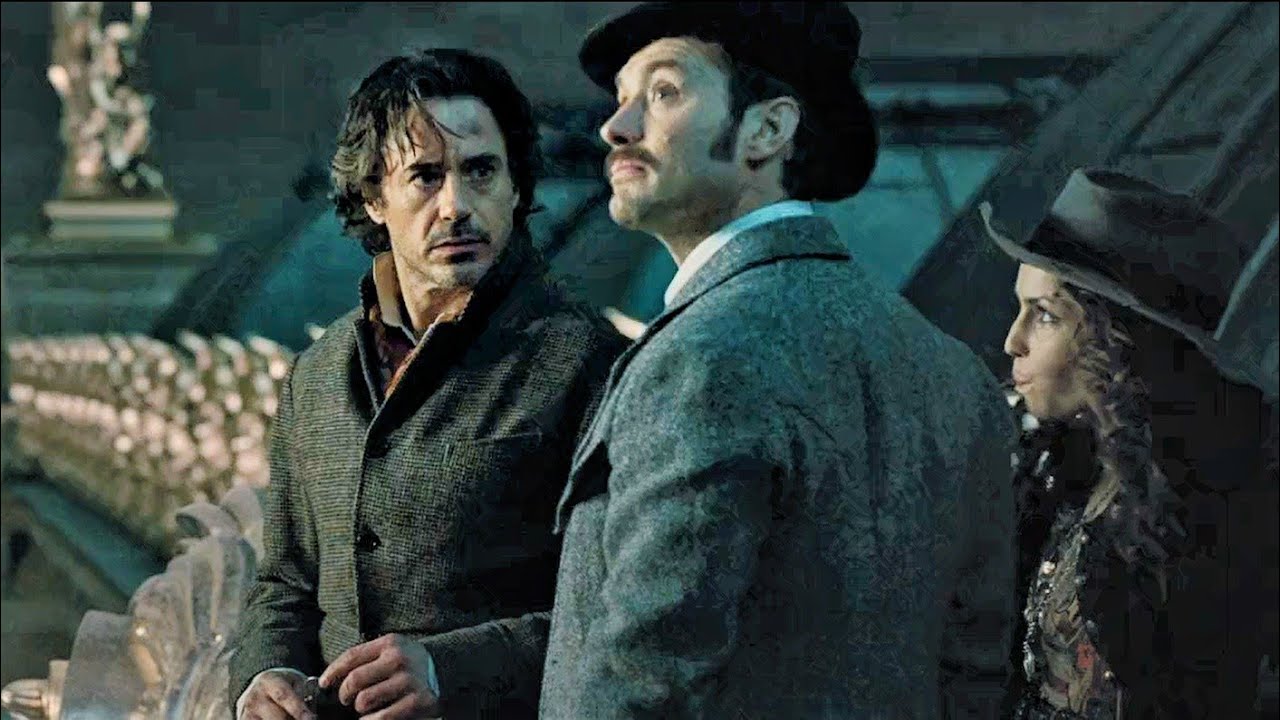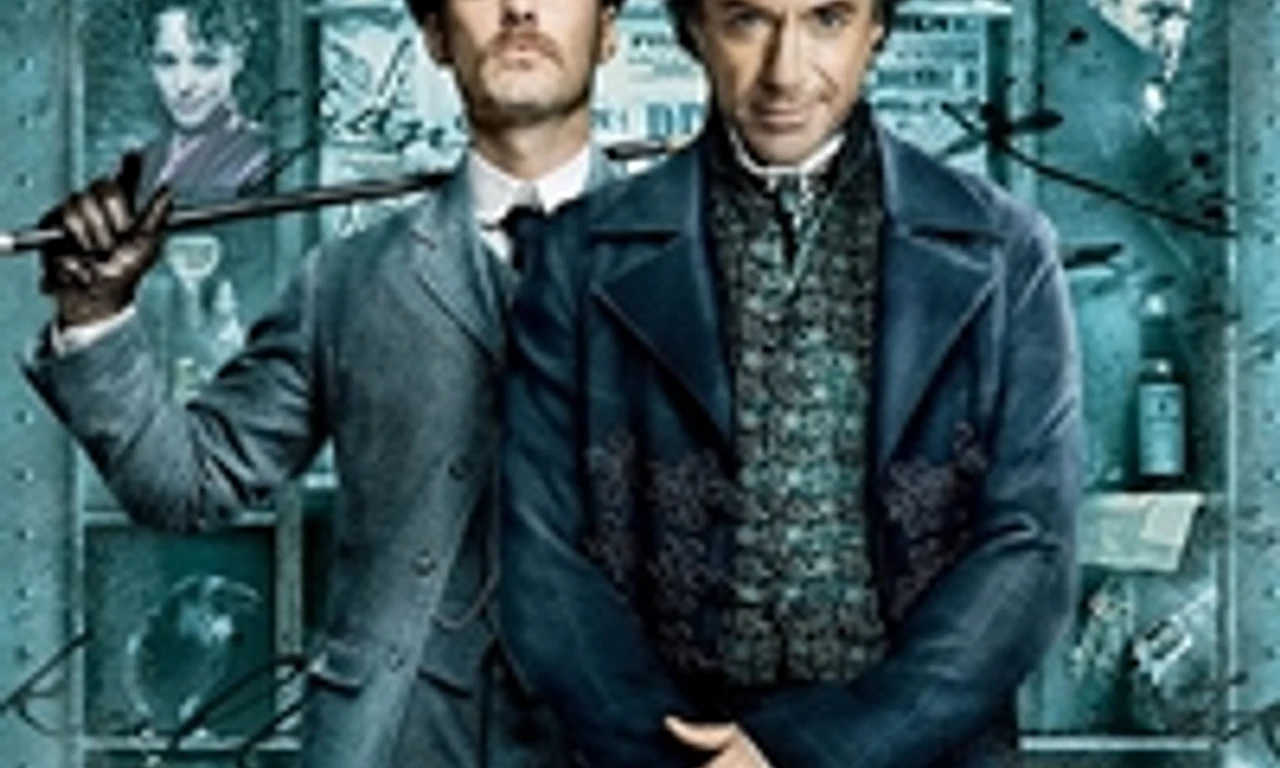Sherlock Holmes (2009)

Review of Sherlock Holmes (2009)
Directed by Guy Ritchie and starring Robert Downey Jr. as the iconic detective Sherlock Holmes and Jude Law as his loyal companion Dr. John Watson, Sherlock Holmes (2009) is a thrilling, action-packed reimagining of Arthur Conan Doyle’s beloved characters. While staying true to the essence of the original stories, this film brings a fresh, modern sensibility to the Holmes saga, blending sharp wit, high-energy action, and dark mystery. With its fast-paced direction, visually dynamic style, and charismatic performances, Sherlock Holmes became an instant hit with both critics and audiences, revitalizing the detective genre for a new generation.
Ritchie, known for his energetic and stylish filmmaking, injects his trademark flair into the film, resulting in a Sherlock Holmes who is more than just the brilliant, eccentric detective of literature. This version of Holmes is a dynamic, almost action-hero-like figure, combining intellect with physical prowess. The film explores both the character’s sharp intellect and his more impulsive, erratic qualities, all while providing an intriguing case that has global implications.
Plot: The Case of the Occultist
The plot of Sherlock Holmes revolves around a dark and dangerous mystery that threatens the stability of England. The story begins with Sherlock Holmes and Dr. John Watson investigating the mysterious events surrounding the arrest of Lord Blackwood (Mark Strong), an occultist and suspected murderer who has been terrorizing London. Blackwood has used his supposed supernatural powers to manipulate people and commit heinous crimes, leading many to believe that he is beyond the reach of the law.
However, after his trial and execution, Blackwood mysteriously returns from the dead, seemingly fulfilling his sinister prophecy of destroying the very fabric of society. As Holmes and Watson work to uncover the truth behind Blackwood’s apparent resurrection, they are drawn into a web of conspiracy, secret societies, and hidden powers. Along the way, they encounter Irene Adler (Rachel McAdams), a mysterious woman from Holmes’s past, who plays both sides of the investigation, complicating matters further.
As Holmes delves deeper into the mystery, he uncovers a larger plot that involves powerful political and industrial forces. The stakes rise as Blackwood’s plan threatens not only London but the future of the British Empire. In true Holmesian fashion, the detective relies on his keen powers of observation, deduction, and disguise to solve the puzzle and stop Blackwood’s nefarious scheme.
What sets the film apart from traditional Sherlock Holmes adaptations is its focus on physical action and the film’s pacing. Ritchie moves away from the classic portrayal of Holmes as a cerebral detective who relies solely on his intellect. Instead, the film shows Holmes engaging in physical combat, using his environment to his advantage in an almost martial arts-style showdown. This action-packed approach, while diverging from the source material, gives the film a dynamic and energetic feel that will appeal to a modern audience.
Themes: Reason vs. Occult, Friendship, and Identity
Sherlock Holmes deals with a number of themes, with a major focus on the battle between reason and superstition. Lord Blackwood’s apparent mastery of occult rituals and his seemingly supernatural powers challenge Holmes’s scientific approach to problem-solving. As Holmes investigates, he must confront his own understanding of the world and question whether the seemingly irrational is truly beyond explanation. This central theme of reason vs. the occult adds a layer of depth to the film, with Holmes using his sharp mind to dismantle the myth and uncover the truth behind Blackwood’s schemes.
Another key theme is the evolving relationship between Sherlock Holmes and Dr. John Watson. The two characters share a deep and sometimes fraught friendship. While Watson is often the voice of reason and caution, Holmes is erratic, obsessed, and driven by his need to solve puzzles. Despite their differences, they work together seamlessly, with Watson often finding himself in situations where he has to step up and assist Holmes, both intellectually and physically.
The film also explores Holmes’s complex sense of identity. He is a man who thrives on solving puzzles, but he is also deeply solitary and emotionally distant. The film touches on Holmes’s internal struggle as he navigates his personal relationships — particularly with Irene Adler, who challenges both his heart and his intellect. Her appearance complicates Holmes’s sense of self, and her presence in the narrative adds a layer of emotional complexity to his character. Unlike many of the more straightforward portrayals of Holmes, this version of the detective is shown to have a deeper emotional range, making him a more relatable and nuanced character.
Direction and Style: Guy Ritchie’s Signature Touch
Guy Ritchie’s direction is a perfect match for this reimagined version of Sherlock Holmes. Known for his fast-paced, stylish, and visually arresting filmmaking, Ritchie brings an energy and flair to the film that makes it stand out from other adaptations. He uses a range of cinematic techniques — such as slow-motion sequences, quick cuts, and visual effects — to enhance the action and make the audience feel immersed in the detective’s world. The result is a film that blends cerebral mystery with thrilling action sequences, making it appeal to a wide range of viewers.
Ritchie also brings a strong sense of visual style to the film. The look of Sherlock Holmes is gritty, dark, and atmospheric, capturing the foggy streets and seedy underbelly of Victorian London. The set design and costumes are rich in detail, immersing the audience in the historical period while giving the film a contemporary, almost comic-book-like feel. The film’s look is less about Victorian grandeur and more about the industrial revolution’s rough, gritty reality. The mise-en-scène is filled with detail, and the action scenes are choreographed to match the raw, physical style of the film.
One of Ritchie’s standout techniques is the way he stages the action sequences. Particularly memorable is a scene where Holmes mentally analyzes and plans out his movements before engaging in a brutal fight. The slow-motion sequence shows how Holmes uses his superior intellect and knowledge of combat to win the battle. These sequences, which emphasize both mental and physical prowess, create a fresh interpretation of Sherlock Holmes as not only a brilliant detective but also a formidable adversary.
Performances: Robert Downey Jr. and Jude Law
The performances of Robert Downey Jr. and Jude Law as Sherlock Holmes and Dr. John Watson are crucial to the film’s success. Downey Jr. brings a quirky, unpredictable energy to the role of Holmes, capturing the character’s eccentricity and brilliance while also exploring his vulnerability. His portrayal is not a traditional, stiff Holmes but rather a more modern and flawed version of the iconic detective. Downey Jr.’s charm and wit add a contemporary edge to the character, making him feel relatable and grounded while still maintaining the essence of Doyle’s creation.
Jude Law’s portrayal of Dr. John Watson is equally compelling. While Watson is often depicted as a sidekick or comic relief in other adaptations, Law’s Watson is more proactive and vital to the story. He provides the emotional anchor to Holmes’s erratic behavior, and their friendship is one of the film’s most compelling elements. Law’s chemistry with Downey Jr. is palpable, and their dynamic as partners in both crime-solving and physical confrontations is both humorous and heartwarming. Watson is more than just a sounding board for Holmes; he is an equal participant in the investigation, adding a layer of depth to his character.
Rachel McAdams, as the enigmatic Irene Adler, is also a standout. While Irene is traditionally seen as a love interest in the Sherlock Holmes canon, McAdams’s portrayal brings a sense of mystery and complexity to the character. She is smart, resourceful, and not merely a damsel in distress. Irene has her own agenda, and McAdams brings a charm and strength to the role that makes her a fitting foil for Holmes’s intellect and unpredictability.
Mark Strong, as the villainous Lord Blackwood, adds gravitas to the film. Blackwood is a menacing and calculating antagonist, and Strong’s performance gives the character a sense of danger that matches Holmes’s genius. Though Blackwood is a more traditional villain, Strong’s portrayal ensures that he remains a credible and formidable adversary for Holmes and Watson.
The Score: Hans Zimmer’s Iconic Soundtrack
The film’s music, composed by Hans Zimmer, is another standout feature. Zimmer’s score is a mix of orchestral and contemporary elements, perfectly capturing the film’s blend of historical mystery and modern action. The music is dynamic and energetic, punctuating the film’s fast-paced action while also providing emotional depth during more reflective moments. Zimmer’s soundtrack helps to establish the tone of the film, balancing the intellectual intrigue of the investigation with the adrenaline-fueled action.
The main theme is bold and memorable, with a driving rhythm that complements the film’s fast pace. The score is not only a backdrop to the action but also helps to underscore the emotional arcs of the characters, particularly the growing bond between Holmes and Watson.
Conclusion: A Fresh Take on a Timeless Character
Sherlock Holmes (2009) is a bold and thrilling reinvention of Arthur Conan Doyle’s iconic detective. By combining elements of action, mystery, and humor with a unique visual style, Guy Ritchie creates a Sherlock Holmes who is both familiar and new. Robert Downey Jr.’s charismatic portrayal of Holmes, paired with Jude Law’s grounded performance as Watson, forms the heart of the film, and the sharp, witty script ensures that the film never loses its sense of fun. With high-energy action, clever mysteries, and a memorable villain, Sherlock Holmes is a refreshing and exciting take on a classic character — one that remains a standout in the world of modern action-mysteries.
In the end, Sherlock Holmes successfully updates the legendary detective for a new era while staying true to the intellectual brilliance and quirky charm of the original character. It’s an action-packed, smart, and entertaining film that captures the spirit of the great detective while adding a layer of modern excitement and intrigue.











